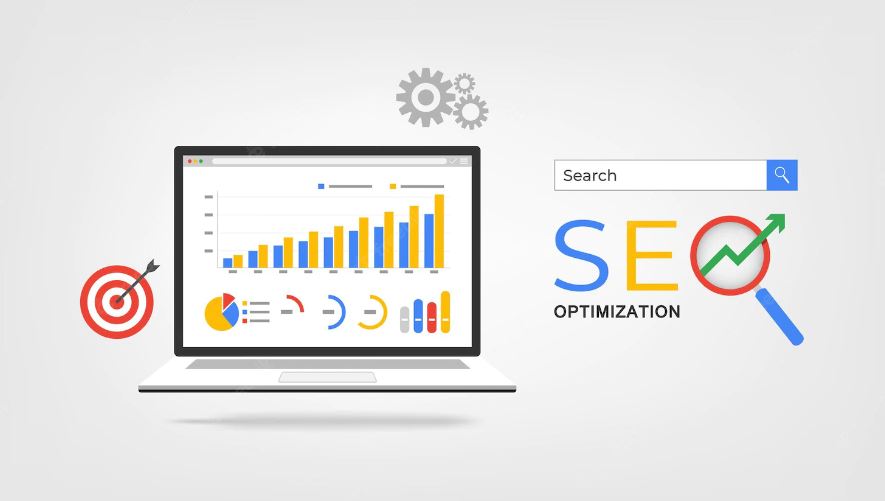First again, what is search engine optimisation (SEO)? In short, it is the practice of creating and optimising content. Ideally, in a way that is the best for visitors to consume, including search engine crawlers. Therefore, it is to improve the quality of the content. The better the quality, the more traffic you will receive from search engines.
So, how to improve SEO scores will come with different criteria’s, which we will see the following paragraph, going on with content and the page keywords data.
Main SEO areas
We write and develop content for people and the search engines want to display accurate quality to their users. When you create content, the search engine then verifies the results and gives it a kind of internal score. Some criteria’s would be the URL, the title tag, the headings and the links, as internal and external. Depending on how good the score and how much the search engines like it, the better it will rank.
Who can influence?
1. Content creators, as writers, photographers, videographers.
2. Technical staff, as the front end, the back end and the infrastructure.
In more details, factors for ranking are:
- Number of incoming links
- Quality of incoming links
- Keyword phrase usage
- User experience
- Page loading speed
- Domain authority
- Social media signals
- HTML and schema markup
- Mobile optimization
- Key usage metrics
These are some of the most important factors for the search engines and which are therefore minutely analysed, but how to get better?
Content! Relevant and authoritative content is key
The better the quality, the better you will be displayed in the rankings. The number one priority is therefore the content your create. Quality content created specifically for your intended target audience, as the users you would like to please. This will then improve the quality of your website and its authority. So time to tune up your web writing skills and present the best possible.
Keywords and keyword phrases
Short tail, long tail, however it should suit what your audience is searching for. These are the keywords and keywords phrases typed into the search engine. Think about your reader and what they might search for that specific page, with search terms like:
- search engine optimisation
- how to optimise for seo
- important criteria’s for seo
- how to improve my website with seo
- seo help ideas
- how to improve your seo on shopify
- how to improve your seo on google
- how to improve seo on your website
- how to learn seo
- what is relevant for seo
- how does seo help
- seo tipps
- seo advice
- how to improve your seo ranking
- how to use google business to improve your seo
Placing keywords and keyword phrases into the content will improve its quality for SEO. Ideally, with one page, it would go with one idea and one key phrase. Synonyms go well, but spreading too many ideas and topics, would be counterproductive. It is ideal for increasing the topic or idea’s value.
Keep in mind, your content should be natural and user-friendly. Also keep in mind, readability and usability.
Content is king or queen
Having a good name for your URL (slug), title, headings and content is the key point and nice, for your readers and SEO. Keeping a nice structure will improve the readability, but to remember, help and guide the reader, the key words and phrases should be repeated, not too much, but enough to not loose track.
The structure should have an introduction, a development phase and a conclusion.
The introduction brings up the topic by defining the context. It is meant to introduce the concerned question in the most simple way. The idea is to captivate the readers, so the they are the most inclined to continue to read. After you introduced the problematic, you will also present the specifics of the subject. You have to define the scope of the article, without starting off with the development. To strengthen the introduction, for example you may also add a quotation of another article. Then you will present the schedule or plan of the article. Note: Avoid thinking that your reader already knows everything.
The content development phase will want to explain and answer the question or problematic at hand. You could be structured at first with an anti-thesis and then the thesis, or use the most common step to step structure. The content will follow upon the plan to prove and explain everything.
The conclusion is the final disclosure of the topic. It is divided into two parts. At first there will have a brief summary to remember the topic, including also the brief answer. In a second part, there will be a reopening of the topic to enlarge again the horizon of the reader, this either with a new idea for a follow up or redirect to the next article or something more general to create a situation of “stay tuned”.
Update your content
The world does not stand still and continuously moves on, so should also your content. Don’t let the content and pages become old dinosaurs dying in the mud and not being able to survive on their own. Take care of them. Update your content. Create new input. Add some extra links. Continuously enrich your pages as time does progress. The search engine will value it. Not only for the updated information, but it is also a sign as not being dead seven feet underground as indexed on the second page of the search engine.
So, keep your content relevant and regularly audited at least once per year.
Metadata
Have your metadata placed to described you paragraphs to the crawl machine. If you have a CMS, this will help as the options are already set and you only need to choose the option.
The Title Metadata is the most important and represents the headline within the search engine results. Selecting an appropriate keyword phrase will here be the most decisive factor upon more or less traffic.
The Description Metadata is the description given to you page to better understand what it is about. The title may not always be super clear for everyone.
The Keyword Metadata is your support to tabulate search engine rankings. You’ll want to add a variety of keywords and keyword phrases.
Use alt tags
Important not to forget is to always have your media described with alt tags. This means images and videos should always have an alt tag and alternative descriptions. This is mainly for the crawl bot, but also in some cases for the user. These also appear in the search and may also become a source of traffic.
A great help for understanding your Google site stats is the Google search console.
FAQ – frequently asked questions about how to improve SEO scores
How can I improve my SEO score?
You can improve your SEO score by implementing various strategies such as optimizing your content with relevant keywords, improving your site’s loading speed, ensuring your website is mobile-friendly, creating high-quality backlinks, and providing an excellent user experience.
What factors influence the SEO score?
Several factors influence the SEO score including site speed, mobile-friendliness, URL structure, keyword usage, internal and external links, domain authority, user experience, and quality of content.
What is a good SEO score?
A good SEO score is typically above 80 on a scale of 0 to 100. However, it’s important to remember that SEO is an ongoing process, and maintaining a high score requires consistent optimization efforts.
How does website speed affect SEO scores?
Website speed significantly impacts SEO scores as it influences user experience. A slow loading site can increase bounce rates, which may lead to lower rankings in search engine results.
Does mobile-friendliness influence SEO scores?
Yes, mobile-friendliness greatly influences SEO scores. Google uses mobile-first indexing, meaning it predominantly uses the mobile version of the content for indexing and ranking.
How do backlinks affect SEO scores?
Backlinks, especially from high-authority sites, positively impact SEO scores. They signify the trustworthiness and credibility of your website to search engines, contributing to higher rankings.
Elevating SEO Scores: A Strategic Approach
Improving SEO scores involves a comprehensive and strategic approach that addresses various aspects of your website. One of the fundamental ways to enhance your SEO score is by optimizing your content for relevant keywords. This includes title tags, meta descriptions, headings, and the body of the content. However, it’s essential to avoid keyword stuffing as it can lead to penalties from search engines. Instead, aim for a natural and meaningful incorporation of keywords that aligns with the context and user intent.
Another vital element to consider is your website’s speed and mobile-friendliness. With Google’s shift to mobile-first indexing, ensuring your site is mobile-friendly is no longer optional—it’s necessary. Moreover, slow loading times can detrimentally impact your SEO score. Consequently, optimizing images, enabling browser caching, and reducing redirects can significantly enhance site speed and, subsequently, SEO scores.
High-quality backlinks play a substantial role in improving SEO scores. They indicate to search engines that your content is valuable, trustworthy, and credible. To build a strong backlink profile, focus on creating valuable, high-quality content that others will want to reference. Additionally, guest blogging and reaching out to influencers in your industry can also be effective strategies.





